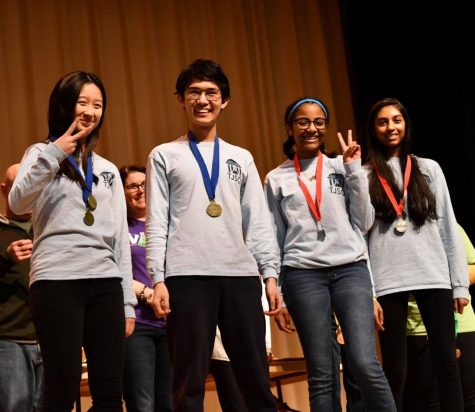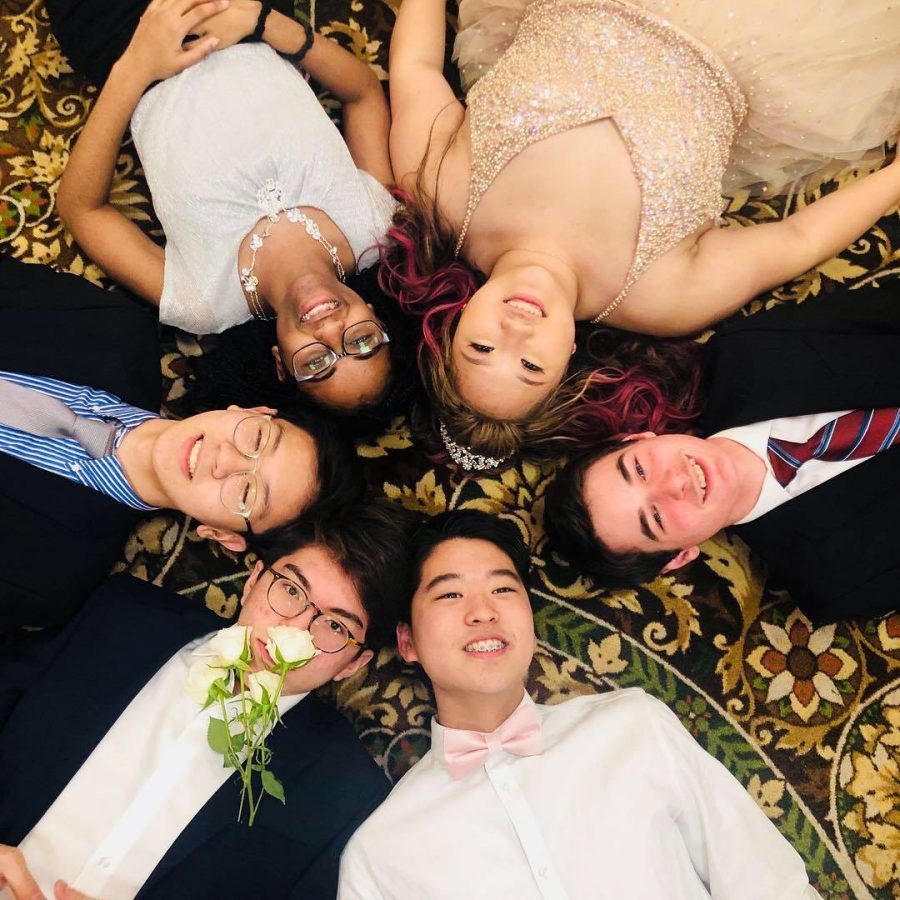My not so Black-and-White look at diversity at Jefferson
Writer’s Note: I have a lot of things to say, so this goes out to anyone that is willing to listen.
June 20, 2020
Black people are less talented at this age.
Black people are less academically driven.
Black people are less qualified to be here than most Asians that apply.
Those are things that have come up in conversations I’ve had regarding the shockingly low number of Black students admitted to the Jefferson class of 2024. The lack of diversity – racially and financially – at Jefferson has been an issue for years. How exactly did we get here?
The issue is not the admissions system, though I admit it has its flaws. Jefferson’s lack of diversity reflects a greater injustice in our education system – an injustice that I’ve known all too well since I was eight years old.
My story is one of two siblings with the same culture and same support system. One ended up in a low income high school, and the other at the top high school in the nation. One ended up “Black,” and the other one “white-washed.”
My parents, born and raised in Sudan, were unaccustomed to the education system when they moved here. When I, the oldest sibling, was in elementary school, they were surprised to hear that I had been accepted into the Advanced Academics Program (AAP).
I remember walking in line to my advanced math class, and saying, “I can’t wait to be in the Gifted and Talented program.” That is what it used to be called. My teacher turned around in a heartbeat, snapping at me: “Don’t call it that. It’s called the Advanced Academics Program,” It turns out the old name had received plenty of backlash, since it implied that students not in the program were neither gifted nor talented. I didn’t know that, but I made sure not to say it again.
I started third grade on the second floor of the school, with a new group of people. We were the “smart” kids. The General Education (Gen-Ed) kids were outside in the trailers – filtered away, labeled as “dumb” and otherwise forgotten. We had constant support from our teachers. We had cool projects, and the parents always bought pie for Pi Day; life, as I knew it, was pretty good as an AAP student. I learned later that the Gen-Ed kids didn’t have the same cool projects and they didn’t get Pi Day celebrations. I thought about it sometimes. It was kind of sad, but it’s just some pie, right?
One day in third grade, my class was walking into the cafeteria, and a Gen-Ed class was walking out. That was when I noticed most kids in the class walking out, were Black or Hispanic – nearly zero White kids. When I looked at my line, I realized that it was me who was the odd one out. That was the first time I noticed my race at school.
New kids entered the program each year, but it wasn’t until sixth grade that a Black student came along. That’s how it was. AAP kids were white and labeled “smart,” Gen-Ed kids were Black or Hispanic and labeled “dumb.” That became the norm. It was fine with me because I was the exception…right?

That norm followed me home, to my younger brother. He is one year younger, and he didn’t get admitted into the AAP program. Years went by, and as I worked harder, he stopped trying. Now I am a rising senior at TJ, and he is a rising junior at Hayfield High School. He has straight As. I do not. I spend hours studying every day; he does not. He fits the stereotypical picture of a Black kid; he uses slang, he plays a sport, and if you knew him, you’d think he doesn’t try that hard with school. You could call him less talented and academically driven, as people have told me Black people usually are. On the other hand, some would say to me, “You look Black, but why don’t you talk like you’re Black? Why don’t you act Black? Why do you sound like a White person?”
Now, let’s rewind. AAP kids are supposedly smart, Gen-Eds are supposedly dumb. I knew it, my classmates knew it, even the teachers made their respective comments. Imagine if you were a Gen-Ed student. Imagine being told, from eight years old, that you’re stupid. Imagine watching this other group of students – the “smarter ones” – do all the fun projects and have activities like Pi Day. Suddenly, it’s not just pie anymore. Suddenly, AAP stops being this cool harmless program. Suddenly, you can’t really blame those kids – those majority Black and Hispanic kids – for not trying in school. Why should they?
I wasn’t the exception. I was lucky. There is a huge difference. I’m not much different than a lot of other Black kids – especially at seven years old, when I was admitted into the AAP program. If I hadn’t gotten into AAP, my innate potential would have remained untapped and eventually crushed by the label stamped on me as “Gen-Ed.” I would not have gotten into Jefferson; I would not have the self-confidence that my brother had stolen from him.
When my mom mentioned taking honors classes, my brother’s response was, “No, I’m not smart enough.” He did just fine. When my dad said to take some Advanced Placement classes, his response was, “No, it’s too hard for me.” He has all As. My brother is not less talented. But less academically motivated? If any Jefferson student were in his shoes, could they say they would be as motivated as they are today? My parents have stressed the importance of education to the two of us for as long as I can remember. My parents have done their best to push him in the right direction. But how much can they really do when, outside of our four walls, the world has trapped him in a world of self doubt? This is the case for most Black students: most are very capable, they just lack the courage to try. My brother was labeled from day one, and that left a scar.

One could say that being in AAP – going to Jefferson – shows that I got the better end of the deal, but I’d argue it left scars of its own. My brother had his self-confidence taken away from him. But for me, there was no one like me growing up, from the AAP program to my time here at Jefferson. At eight years old, I didn’t understand the history; I didn’t realize there was something wrong with the system. But, one thing was painfully clear. I had to get as far away from being Black as I could – if I wanted to fit in, that is.
But the fitting in never came. My years here at Jefferson have been filled with shameful walks down the hall, wondering if anyone was staring at me, thinking “Whoa, look, a Black kid,” and the racist jokes that seemed funny to everyone but me. My desperate attempts to fit in reached an all-time low when, the summer after my freshman year, I tried to bleach my skin. I thought I could look less Black; I thought I’d finally fit in. I almost ruined my skin permanently. As I stared at my blotchy face in the mirror, I realized that one year at Jefferson made the real me – from my culture to my own skin – feel foreign and unwanted. My school didn’t accept me; I didn’t accept me. At that moment, I felt completely and utterly alone.
That’s where my story ends, with two siblings: the same upbringing, but two completely different stories to tell. One ended up with a crippled self-confidence, and the other trapped in a world where she will never belong.
My brother and I may share a bedroom wall, but our worlds are galaxies apart. But despite our differences, my brother and I share one awful commonality: we are products of systemic racism.
Systemic racism is an awful disease that plagues this nation. Adjusting the admissions system treats a symptom, but it’s time to tackle the disease at its roots. While I can not speak for all Black people, I believe I speak for many when I say that it is not an elite Jefferson education that we yearn for. What Black people want is simple: a fighting chance. The truth is, in many ways, AAP and Gen-Ed separation is segregation by privilege, wealth and race. The truth is, Gen-Ed and AAP students are separate but not equal.

Karen Ampeh • Jun 26, 2020 at 8:00 am
Thank you for telling this. But the TJ admissions is to be blamed for much of this and it should be addressed ASAP. They must admit classes more racially representative of the community. It’s just “wrong” to admit black children to AAP and TJ and let them find themselves alone in nearly every class attracting stares and remarks daily about how they could have gotten there or why there are not more there like them. This happened to 3 of my children. Either AAP and TJ should admit zero black students or they should admit a number close to 10%, because this status quo of the token back student is part of systemic racism.
Gaby Trigo • Jun 25, 2020 at 10:27 pm
Didi- thank you for unearthing your traumatizing experience, calling out a fundamentally broken system, and highlighting that the “success” of TJ students is really nothing more than drawing lucky cards from the deck.
Your piece is eloquent, honest, and speaks undeniable truth. You’re a brave woman. Both you and your brother will make an impact in this world. Keep speaking out, it inspires others to, and people will listen.
Rawi Hago • Jun 23, 2020 at 11:33 am
Thats awesome. Im also Sudanese. Black. Graduated TJ in 99. I know exactly what youre talking about. I remember the kids my day used to talk about how the few black kids must’ve got in because of affirmative action type policies. It infuriated me, that even after I had proven myself by doing well on the entrance exam, my place was still questioned. So you what I did? I shut them all up by getting a 3.8 GPA by graduation. And you know whats even wilder about that? Those kids’ response was just to mutter something about how intelligence cannot be truly quantified in a classroom.
Its just ‘kibr’ kid, its ugly and its why it has to be burned in ‘jahanam.’ So dont worry about it.
Iris Warchall • Jun 22, 2020 at 6:43 pm
Thank you, thank you, thank you, from a 2006 alum. By sharing your and your brother’s stories, you are sharing exactly what needs to be heard by a lot of people right now.
Jorge Torrico • Jun 22, 2020 at 6:39 am
Powerful testimony, thank you.